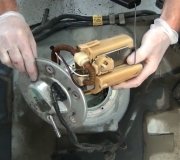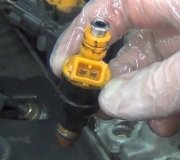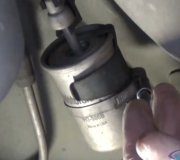Some recurring or repeat fuel pump failures are also solved by cleaning the gas tank before installing the next new fuel pump. The best way to have this done is to have it steam-cleaned at a radiator repair shop.
As far as products that you can pour in, those would all do the same thing as the ethanol in regular gas. That is to dislodge machining oils and chips or welding debris. That debris will be collected in the strainer that is usually attached to the fuel pick-up tube in the tank. There's a pretty good chance that strainer will not become clogged from that minimal debris, and if any chips were to make it through, the regular fuel filter will take care of that.
Back when ethanol first started showing up in gasoline, it became well-known to "clean" the fuel system. Particles of rubber hoses that were dry-rotted on the inside would break off. Varnish build-up that general never caused a problem as long as it was left alone, and the mold that fed on the ethanol and grew in the tank, would commonly plug fuel filters and strainers. It didn't take long for manufacturers to switch to rubber compounds for hoses that were resistant to that ethanol. That ethanol still caused trouble for small engines on lawn mowers, snowblowers, generators, and chainsaws for many years. Since those engines typically hang around for a long time, every city still has at least one gas station that offers ethanol-free gas for this reason.
Friday, May 15th, 2020 AT 4:18 PM


